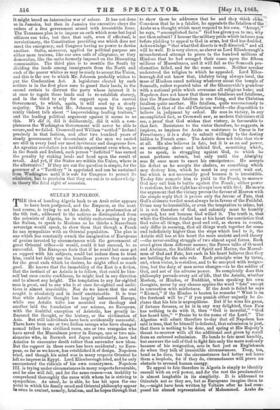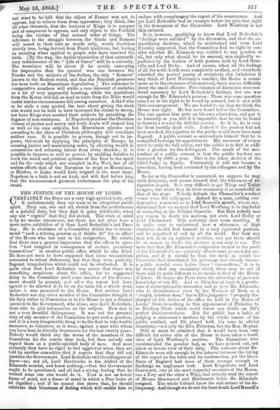SULTAN NAPOLEON.
THE idea of handing Algeria back to an Arab ruler appears to have been postponed, and the Emperor, as the next best course, is trying to act the Arab. In a proclamation of the 6th inst., addressed to the natives as distinguished from the colonists of Algeria, he is visibly endeavouring to play the Sultan, to speak to Moslems as he thinks a Mussulmau sovereign would speak, to show them that though a Frank he can sympathize with an Oriental population. The plan is one which has constantly struck the imagination of Europeans of genius invested by circumstances with the government of great Oriental tribes—it would, could it but succeed, be so• successful. The European feels that if he could but once get en rapport with his subjects, could but induce them to trust him, could but fairly use the boundless powers they concede for the great ends which he desires, he might effect so much good. He knows that the immobility of the East is a fiction, that the instinct of an Asiatic is to follow, that could he him- self but once excite confidence, he might lead'in any direction and to almost any height. The temptation to any far-sighted man is great, and to one who is at once far-sighted and ambi- tious is almost irresistible. Nor do we know, that the end sought is absolutely and in itself unattainable. It is true that while Asiatic thought has largely influenced Europe, while one Asiatic tribe has moulded our theology and another laid the foundation of our science, no European, with the doubtful exception of Aristotle, has greatly in- fluenced the thought, or the history, or the civilization of Asia. But still individuals have been accidentally successful. There have been one or two Indian satraps who have changed nomad tribes into civilized races, one or two renegades who have saved the Mussulman power in Europe, one or two mis- sionaries who, in Burmah and Japan particularly, have led Asiatics to encounter death rather than surrender new ideas. But the rapport in these cases has been accidental ; no Euro- pean, so far as we know, has established it of design. Napoleon tried, and though his mind was in many respects Oriental he left no impress in Egypt. Lord Ellenborough tried, and he only encountered the ridicule of his own countrymen. Napoleon III. is trying under circumstances in many respects favourable, and he also will fail, and for the same reason—an inability to comprehend thoroughly the races with whom he is striving to sympathize. As usual, he is able, he has hit upon the one point in which his family creed and Oriental philosophy appear to come in contact, namely, fatalism, and he hopes through that to show those he addresses that he and they think alike:. Conscious that he is a fatalist, he appeals to the fatalism of the Arabs as a thought which must respond to his own. "Accept," he says, "accomplished facts." God has given: you to me, why not then submit? I honour the military pride which induces you before yielding to appeal to God in arms, but God has decided. Acknowledge " that what God Erects is well directed," and all . will be well. It is very clever, as clever as Lord Ellenborough'a misunderstood attempt to prove to the hundred millions of Hindoos that he had avenged their cause upon the fifteen millions of Mussulmans, and it will fail as the Semnath pro- clamation failed, and for the same reason. Neither speaker understood the religion to which he appealed. Lord Ellen- borough did not know that, idolatry being always local, the mass of Hindoos eared nothing whatever, about the temple of Soranath, rather repeated tales of the Ghaznevide's grandeur with a national pride which overcame all religious hate-; and Napoleon does not know that there are fatalisms and fatalism, that the Mussulman fatalism is one thing, and the Christiam fatalism quite another. His fatalism, quite unconsciously to. , himself, is that of the old Christian world—the disposition to believe in judgment by ordeal. He sees in victory, in any' accomplished fact, as Cromwell saw' as modern Calvinists still. see, a proof that God wishes that victory, is favourable to that fact. Resistance to the victor therefore, he suggests' is- impious, as impious for Arabs as resistance to Cmsar is for Frenchmen ; it is a duty to submit willingly to the destiny hidden in French arms. The Asiatic does not take that view at all. He also believes in fate, but it is as an evil power, as something above and behind God, something which,. so to speak, is struggling against God, to which he must perforce submit, but only until the Almighty - sees fit once more to exert his omnipotence. He accepts. his defeat as he accepts the cholera, as something which may destroy him, which he must in any event wait out, but which is not necessarily good because it is irresistible. To-day fate compels him to yield to the Frank, to morrow God may call him to battle against the Frank; either power is resistless, but the right has always been with God. He meet* the argument that the victory proves the favour of Heaven with the simple reply that it proves only the favour of Fate, that God's ultimate verdict must always be in favour of the Faithful. Crime may be irresistible, or even the temptation to crime, but it is not therefore of God, and calamity must be humbly, accepted, but not because God willed it. The truth is, that' while the Christian fatalist has at his heart the conviction that. God rules all things, that good and evil, as shown in events,. only differ in seeming, that all things work together for some- end indefinitely higher than the steps which lead to it, the- Asiatic still has at his heart the more ancient and evil theory —the never-ending struggle of two almost equal forces. Each creed gives them different names; the Parsee talks of Ormusd and Ahriman, the Buddhist of Spirit and Matter, the Mussel- man of God and Fate, but each in his heart believes that they are battling for the sole rule. Each .principle wins by turns,... and, when victor, is resistless, and to be accepted with resigna-* tion, but the duty of man never changes—to be the soldier of God, and not of the adverse power. So completely does this philosophy pervade every act of life, that the Asiatic, whether Moslem, or Hindoo, or Buddhist, when speaking his owil thoughts, never by any chance applies the word "fate" except in connection with misfortune. If the Arab is foiled he says. " Kismet," if the Hindoo is beaten he remarks "What is on the forehead will be ;" if you punish either unjustly he de- , clares that his fate is unpropitious. But if he wins his game, if fortune favours, or he is in any way delighted, then Fate- has nothing to do with it, then "God is merciful," " GocT has heard him," "Praise be to the name of the Lord." The- Algerine will admit therefore to-day that all Napoleon has. said is true, that he himself is defeated, that submission is just,. that there is nothing to be done, and spring at His Majesty's. throat to-morrow with all the additional zed given by recoil from an enforced submission. He bends to fate most humbly,. but answers the call of God to fight fate only the more zealously because of his resignation, acts in fact just as Englishmen, do when they talk of irresistible circumstances. They, too,, bend as he does, but the circumstances had better not leave- them a loophole, for if they do, circumstances will prove no. obstacle to aroused human energy.
To appeal to fate therefore in Algeria is simply to identify oneself with an evil power, and .for the rest the proclamation is almost laughable in its simplicity. It is addressed to
Orientals not as they are, but as Europeans imagine them to be —might have been written by Voltaire after he had corn-, poled his absurd representation of Mohammed. Arabs do
not want to he told that the object of France wan not to oppress, but to relieve them from oppression; they think, like all other Orientals, that the business of Kings is to conquer and of conquerors to oppress, and only object to the Faithful being the victims of that natural order of things. The reference to the struggle between the Gauls and Romans will sound in their ears as words only, words doubtless strictly true, being derived from Frank traditions, but having no meaning when applied to people who have received the faith. [By the way, the Arabic translation of that extraordi- nary reminiscence of the "Life of Cesar" will be a cariosity. The translator will be clever if he avoids conveying the impression that the quarrel was one between the Franks and the subjects of the Sultan, the only "Romans" known to the Moslem world, and that the Frankish greatness has been built on Mussulman degradation.] The reference to comparative numbers will strike a race innocent of statistics as a bit of very ungraceful boasting, while the quotations from the Koran will fall as dead as texts from the Bible would under similar circumstances fall among ourselves. A thief who as he stole a eoat quoted the text about giving the cloak also would not be held to have increased his claims to mercy, nor have Kings ever soothed their subjects by preaching the dogmas of non-resistance. If Napoleon practises the Christian virtues of justice and mercy and truth Arabs will respect him as well as his own subjects, but Mussulman phrases used according to the ideas of Christian philosophy will conciliate neither race. It is possible to govern, though not to im- prove, Orientals by applying the principles of Europe by
securing justice and maintaining order, by allowing wealth to accumulate and releasing labour from every shackle' it is
possible to improve as well as govern by enabling Asiatics to work the social and political systems of the East in the spirit and for the ends which are accepted in the West, but of all useless efforts that of the European to reign as Mussulman, or Hindoo, or Lama would have reigned is the most inept. Napoleon in a balk is not an Arab, and will find before long that the unaccustomed garment embarrasses the play of his sword.































 Previous page
Previous page